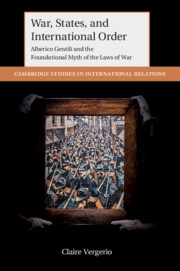Refine search
Actions for selected content:
7 results
6 - Carl Schmitt and the Entrenchment of the Myth
- from Part II - Gentili’s De iure belli and the Myth of “Modern War”
-
- Book:
- War, States, and International Order
- Published online:
- 21 July 2022
- Print publication:
- 04 August 2022, pp 213-246
-
- Chapter
- Export citation
4 - Unearthing the “True Founder” of International Law
- from Part II - Gentili’s De iure belli and the Myth of “Modern War”
-
- Book:
- War, States, and International Order
- Published online:
- 21 July 2022
- Print publication:
- 04 August 2022, pp 135-171
-
- Chapter
- Export citation
Introduction
-
- Book:
- War, States, and International Order
- Published online:
- 21 July 2022
- Print publication:
- 04 August 2022, pp 1-19
-
- Chapter
- Export citation
Conclusion
- from Part II - Gentili’s De iure belli and the Myth of “Modern War”
-
- Book:
- War, States, and International Order
- Published online:
- 21 July 2022
- Print publication:
- 04 August 2022, pp 247-261
-
- Chapter
- Export citation
5 - Constructing the History of the “Modern” Laws of War
- from Part II - Gentili’s De iure belli and the Myth of “Modern War”
-
- Book:
- War, States, and International Order
- Published online:
- 21 July 2022
- Print publication:
- 04 August 2022, pp 172-212
-
- Chapter
- Export citation

War, States, and International Order
- Alberico Gentili and the Foundational Myth of the Laws of War
-
- Published online:
- 21 July 2022
- Print publication:
- 04 August 2022
3 - The Transition
-
- Book:
- Just War and Ordered Liberty
- Published online:
- 08 January 2021
- Print publication:
- 07 January 2021, pp 53-80
-
- Chapter
- Export citation
